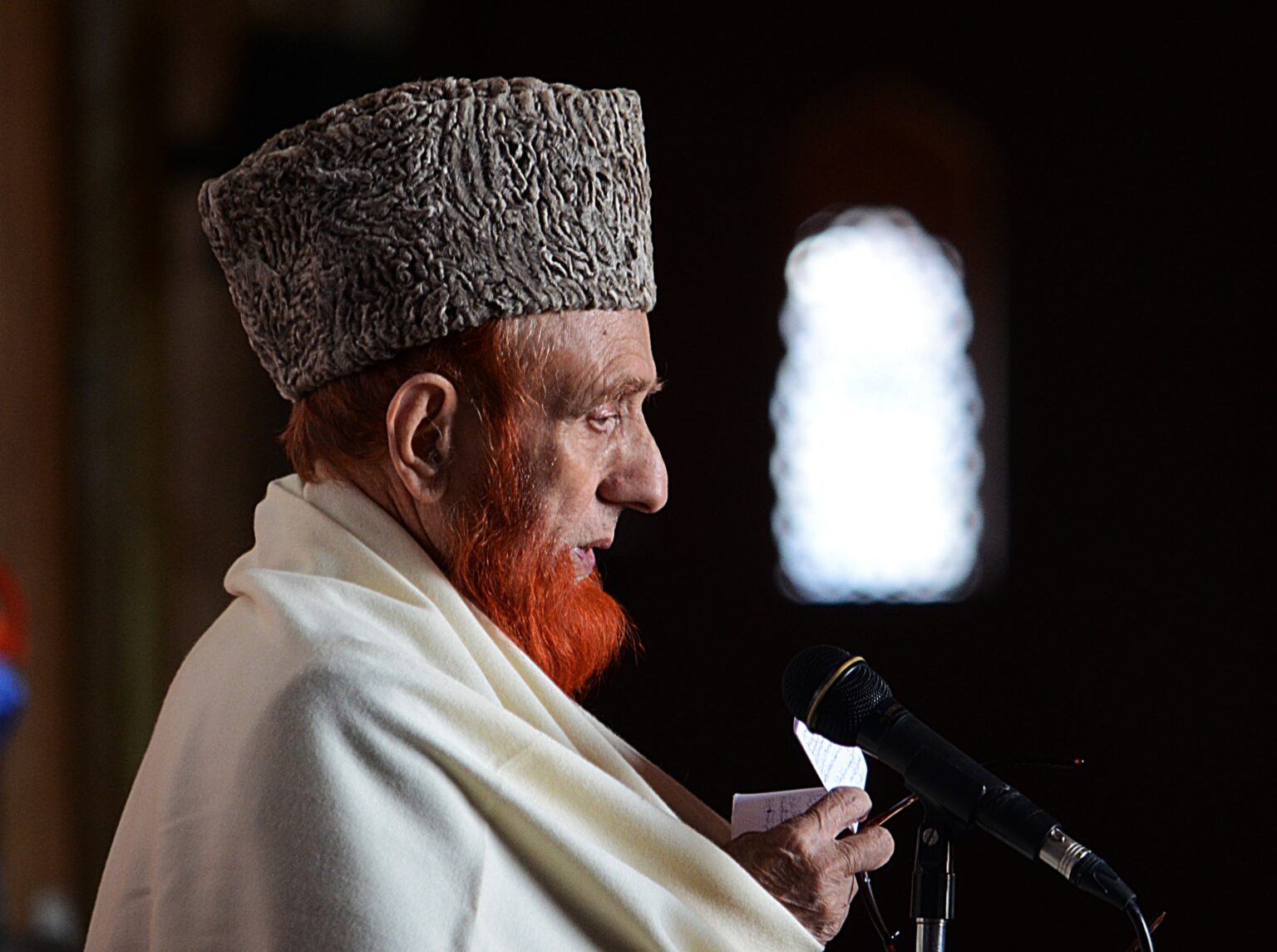Syed Ahmad Sayeed Naqshbandi is the Imam-e-Hai of Jamia Masjid, the historic grand mosque of Kashmir. He talks to Bilal Bashir Bhat about his life, religion, Kashmiri society and the role of preachers and religious scholars among other things.
Could you please provide a brief overview of your scholarly journey?
Initially, I studied Arabic at the Oriental College, Srinagar. There, I acquired a Maulvi Alim degree. After that, I went on to study at Madinat-ul- Uloom where I had the honour of being in the company of the great scholar Maulvi Abdul Kabir. It was followed by Maulvi Fazil course. I also had the privilege to observe the teaching style of Maulana Qasim Shah Bukhari from close quarters. Later, at the age of 18, I joined the Education Department at Banihal in 1957. Two years later, I was transferred to Srinagar. Back then, my uncle Maulvi Ghulam Hasan was serving as the Imam-e-Hai of Jamia Masjid, Srinagar . While delivering the Friday sermon from the pulpit of Jamia Masjid, he passed away reciting kalima-e-shahadah. He was succeeded by my cousin Maulvi Sharif for seven years until 1962. It was in March of the following year, 1963, that Shaheed-e-Millat Mirwaiz Maulvi Muhammad Farooq became the Mirwaiz of Kashmir. A mere five months later, in August 1963, I was given the enormous responsibility of being the Imam-e-Hai of Jamia Masjid. I would like to mention here that Mirwaiz Maulvi Muhammad Farooq delivered the sermon on the north side of the mosque while I used to deliver hadith lessons near the mehrab, where the pulpit is now. Meanwhile, Mirwaiz sahib was arrested and, after his release more than two and a half years later, the pulpit that is in use today was chosen for teaching and preaching.
Unlike many other imams, you are known for delivering sermons in Kashmiri language. Is there a specific reason for that?
Kashmiri is our mother tongue. It is easier to understand and follow sermons when delivered in native language. In fact, Mirwaiz family has a legacy of preaching and teaching in Kashmiri so that the words have a lasting effect on people’s hearts and minds. I would like to appeal local imams to deliver sermons in Kashmiri language. However, I would like to bring in your notice that there is a small minority of imams in Kashmir who speak Kashmiri as a first language. In many cases, members of the Gujjar community or other non-Kashmiris lead the prayers besides delivering khutbah.
It is sad that despite the holy Quran having several Kashmiri translations, it is not studied in the mother tongue in the valley. What is your opinion regarding the idea of teaching Quran in Kashmiri?
Currently, Urdu is one of the most widely studied languages. There is no doubt that the interpretations of the Qur’an by Muhajir-e-Millat Mirwaiz Maulvi Yusuf Shah Sahib, Jenab Qasim Shah Bukhari and others are easily available, but it is unfortunate that they have been left to gather dust.
For almost three years, Mirwaiz Umar Farooq has allegedly been under house arrest. I say ‘allegedly’ because Lt Governor Manoj Sinha says Mirwaiz is free to roam around, a claim that the Mirwaiz vehemently challenges. What does his absence from Jamia Masjid mean?
In the absence of Mirwaiz Umar Farooq, there is a great deal of pressure on me. But what is more important is that the Muslims of Kashmir, especially those who have benefitted from the Mirwaiz family’s sermons through generations, are deeply pained by his absence from the grand mosque of Kashmir.
A number of preachers are busy spreading hatred between sects and subsects across Kashmir on day to day basis from the pulpits of the mosques and via social media. What should be the role of the more responsible and saner imams in such a situation?
Prophet Muhammad (saw) said that a time would come when adultery, indecency, and alcoholism would be commonplace, elders would not be respected and scholars would be the ones who will spread evil rather than being righteous. Majority of the scholars today fail to follow what they preach, whereas there were many dignified scholars in the past who could hardly afford two square meals but earned widespread respect. In contrast, scholars today are the slaves of materialism in various ways.
There are so many small mosques that organize Friday prayers around Jamia Masjid. Doesn’t this defeat the purpose of the Friday gathering?
This question has come up so many times earlier as well. As a matter of fact, even Mirwaiz Maulvi Farooq Sahib attempted this during his time, but failed. The truth is that there are people who have opened businesses in the name of mosques.
Is there a message that you would like to convey to the people of Kashmir?
To begin with, we should avoid what has been forbidden in Islam. We need to get rid of pomposity, drugs, and wasteful spending on weddings and everything else that embodies evil. Lastly, as long as we keep reminding ourselves that we have to ultimately die, most of our problems will be addressed.
Bilal Bashir Bhat is the editor of the daily Srinagar Jung.
